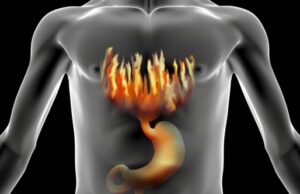Few things can interrupt a good nights sleep like acid indigestion and heartburn. It can come at any moment and seem to strike without warning. For some people this unpleasant experience is brought on by eating or drinking certain foods or certain quantities before bedtime. For others, the triggers are not so obvious and they spend the night wondering what they did to bring this upon themselves. When it comes to treating heartburn and indigestion, there is, like with so many things in life, both good news and bad news.
More than 60 million American adults experience various levels and severity of acid reflux and heartburn at least once a month. About 25 million adults suffer from almost daily heartburn symptoms and experience severe refluxes, mostly at night. These are the people officially diagnosed with Gastroesophageal Reflux Disease. If we took into count the people with mild indigestion and acid reflux the numbers could be as high as three times as many. This is why heartburn treatment is a growing area of concern for health care professionals.
The Good News
The good news is that GERD, known medically as gastroesophageal reflux disease, can be treated with a myriad of simple life changes and basic medications. One of the simplest and easiest steps to lessening your symptoms is to learn to recognize your food and drink triggers. Do spicy foods like chili and salsa have you up all night with heartburn? Are your acid indigestion nights worse after a night of binge drinking? Do you seem to suffer from GERD more frequently after a late dinner? Learning to recognize these situations and dealing with them in the right way can help reduce your instances of heartburn and indigestion. Avoid your trigger foods and be careful of overindulgence in food and drink.
Another easy step is to watch the day to day factors that can impact your stomach and intestines. Aside from food and drink, other factors in your life can aggravate an already sensitive stomach. Stress is one of the leading causes for stomach upset outside of overindulgence. Try to find ways to deal with your daily levels of stress in a healthy way. Exercise, meditate, take up yoga, go for a walk, journal, or talk to someone. Finding ways to relieve stress can do wonders for reducing the frequency and severity of your GERD. Some other habits that can lead to heartburn issues include drinking and smoking and drug use. Eliminating these from your life or greatly limiting your intake of tobacco and alcohol can go a long way in helping you get better sleep at night without being woken by your GERD symptoms.
While there is no sure fire way to prevent heartburn flare ups, lifestyle changes can go a long way in reducing the frequency and severity of attacks. Where these changes are not enough, medication and surgery can come into play- usually as a last option. Let us help you discover relief like you have never known before; contact FirstCare Medical Center today and say goodbye to that heartburn!

